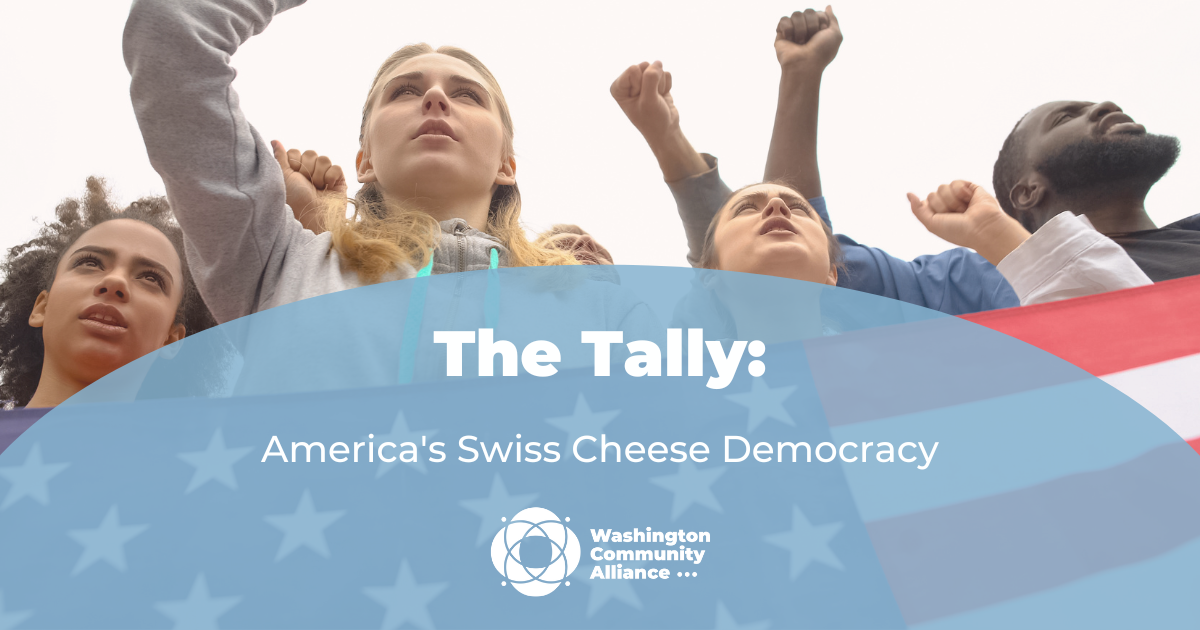
Friends—
Welcome to week four! We’re 15 days away from the first cutoff! We’ll share more with you about legislative cutoffs next week as we get into crunch time. We’re entering the doldrums of session—a waiting game, really, so not a lot of actions this week. That will change as we get down to the wire.
🇺🇸 In lighter news, we’ve got a deep dive into the state of America’s imperiled democracy for you. Scroll all the way down for the yams.
💵 First, the Working Families Tax Credit (which was a priority in year one of The Tally™️) has officially launched statewide! Families can now sign up for the credit. Read more here and spread the good word using this toolkit!
🙋♀️ Also, WCA is hiring! Check out the job description here consider joining this very cool, good-vibes-only team working on only the most important issues that matter to you and the people you care about.
🧀 America’s Swiss Cheese Democracy 🧀
It’s not exactly a secret that voting rights are in trouble in the US: we had a coup and an attempt at a stolen election. Our democracy has been slowly diminishing for a decade thanks to the Supreme Court chipping away at the federal Voting Rights Act. Because the federal protections have weakened, we’re left with a swiss cheese democracy where some states have strong laws to protect voters as others backslide toward outright racist voter suppression.
- 2013: Shelby v. Holder: A decade ago, in a 5 to 4 vote, the Supreme Court struck down the very core of the Voting Rights Act when it stopped requiring states and localities with a history of discrimination against voters of color to clear changes in voting systems with the federal government before they went into effect. Before the Shelby decision, there was a way to stop bad voting laws before they harmed voters. After Shelby, the burden of proof came to rest on voters themselves, forcing them to prove they have been disenfranchised. Following this decision, we saw a series of troubling developments including the closure of thousands of polling places, the rise of voter ID laws, and states demanding proof of citizenship to vote. These changes overwhelmingly disenfranchised voters of color and had huge impacts on the elections following this ruling.
- 2018 Abbott v. Perez: In the Abbott case, the Supreme Court ruled that state legislators were entitled to a presumption of good faith. In other words, we should assume that they aren’t rigging the elections to serve their own interests despite copious evidence to the contrary.
- 2021: Brnovich v. Democratic National Committee: A law in Arizona criminalized the collection and delivery of another person’s ballot. This primarily impacted native folks who use third parties to get their ballots in from remote locations. The Democratic National Committee claimed this law violated section 2 of the Voting Rights Act but the Supreme Court once again failed to protect voters of color.
That brings us to Merril v. Mulligan: a case under consideration at the Supreme Court, right now, that concerns section 2 of the Voting Rights Act, just like Brnovich. Section 2 is the part of the Voting Rights Act that prohibits voting practices and procedures that discriminate on the basis of race.
The Merrill case centers on a district in Alabama made up of mostly Black voters—it’s called the ‘Black belt.’ Alabama’s redistricting process broke this belt into multiple voting districts, thereby diluting the Black vote and making it harder for the folks that live there to elect people who represent their communities. This is a common practice designed to limit the influence of voters of color on elections.
In the Merrill arguments, Alabama takes the position that, if a state has to violate its self-described ‘race-neutral’ map-drawing rules to comply with the Voting Rights Act, the result is an unconstitutional race-based gerrymander. Translation: they don’t see color when they’re being doing racist gerrymandering.
If the Supreme Court rules with Alabama in the Merril decision, the results will be profound. Essentially, states could exempt themselves from the Voting Rights Act by designing ‘race-neutral’ requirements specifically to limit communities of color’s influence on elections. This would allow them to draw maps that swallow the voices of BIPOC voters into white districts under the guise of colorblind neutral mapping.
According to Politico, “The diminished Voting Rights Act has already played a key role, in its absence, in the 2022 elections. Three states that were previously covered by preclearance requirements — Alabama, Georgia and Louisiana — have all seen their maps face significant challenges in federal court over whether or not they give Black voters adequate representation.” The loss of section two would further exacerbate this issue.
Meanwhile, here in Washington, we’ve been improving our voting laws. Here in our state, we passed a Washington Voting Rights Act back in 2018 as part of a comprehensive package of pro-democracy bills.
With our new state laws, in Yakima in 2021, OneAmerica successfully settled a lawsuit after they sued Yakima County for a voting system that disenfranchised Latino voters. The lawsuit and subsequent elections were made possible by the Washington Voting Rights Act. In Wenatchee, the Rural People’s Voice were able to use the Voting Rights Act to prevent a lawsuit. Here’s Arlette Lopez telling the story. In this case, the mere possibility of the suit forced the school district in Wenatchee to reconsider their practices and move to district-based rather than at-large elections. Through these examples and other great work across the state, advocates have learned ways to tighten the bill and make it more efficient and clear. Ultimately, the goal is to avoid lawsuits altogether and instead work towards the important remedies and systems that improve the function of our democracy for everyone.
The federal context makes the work on voting rights in Washington even more important. This session, advocates are working on a technical fix to that bill to improve it further. Here in Washington, there’s already been success in utilizing and implementing our voting rights act. It’s part of our big nine.
What do you think? Have any questions? Tweet us your thoughts @WACommAlliance.
Keep up on the action and opportunities to get involved through our legislative newsletter, The Tally.

